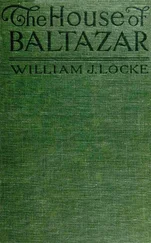William Locke - The Joyous Adventures of Aristide Pujol
Здесь есть возможность читать онлайн «William Locke - The Joyous Adventures of Aristide Pujol» — ознакомительный отрывок электронной книги совершенно бесплатно, а после прочтения отрывка купить полную версию. В некоторых случаях можно слушать аудио, скачать через торрент в формате fb2 и присутствует краткое содержание. Жанр: foreign_language, Прочие приключения, foreign_prose, на английском языке. Описание произведения, (предисловие) а так же отзывы посетителей доступны на портале библиотеки ЛибКат.
- Название:The Joyous Adventures of Aristide Pujol
- Автор:
- Жанр:
- Год:неизвестен
- ISBN:нет данных
- Рейтинг книги:3 / 5. Голосов: 1
-
Избранное:Добавить в избранное
- Отзывы:
-
Ваша оценка:
- 60
- 1
- 2
- 3
- 4
- 5
The Joyous Adventures of Aristide Pujol: краткое содержание, описание и аннотация
Предлагаем к чтению аннотацию, описание, краткое содержание или предисловие (зависит от того, что написал сам автор книги «The Joyous Adventures of Aristide Pujol»). Если вы не нашли необходимую информацию о книге — напишите в комментариях, мы постараемся отыскать её.
The Joyous Adventures of Aristide Pujol — читать онлайн ознакомительный отрывок
Ниже представлен текст книги, разбитый по страницам. Система сохранения места последней прочитанной страницы, позволяет с удобством читать онлайн бесплатно книгу «The Joyous Adventures of Aristide Pujol», без необходимости каждый раз заново искать на чём Вы остановились. Поставьте закладку, и сможете в любой момент перейти на страницу, на которой закончили чтение.
Интервал:
Закладка:
“Decidedly,” said Aristide.
“Then, sir, Mr. Smith has sent the carriage for you.”
“That’s very kind of him,” said Aristide.
The footman picked up the valise and darted down the platform. Aristide followed. The footman held invitingly open the door of a cosy brougham. Aristide paused for the fraction of a second. Who was this hospitable Mr. Smith?
“Bah!” said he to himself, “the best way of finding out is to go and see.”
He entered the carriage, sank back luxuriously on the soft cushions, and inhaled the warm smell of leather. They started, and soon the pelting rain beat harmlessly against the windows. Aristide looked out at the streaming streets, and, hugging himself comfortably, thanked Providence and Mr. Smith. But who was Mr. Smith? Tiens , thought he, there were two little Miss Smiths at the academy; he had pitied them because they had chilblains, freckles, and perpetual colds in their heads; possibly this was their kind papa. But, after all, what did it matter whose papa he was? He was expecting him. He had sent the carriage for him. Evidently a well-bred and attentive person. And tiens! there was even a hot-water can on the floor of the brougham. “He thinks of everything, that man,” said Aristide. “I feel I am going to like him.”
The carriage stopped at a house in Hampstead, standing, as far as he could see in the darkness, in its own grounds. The footman opened the door for him to alight and escorted him up the front steps. A neat parlour-maid received him in a comfortably-furnished hall and took his hat and greatcoat and magnificent bouquet.
“Mr. Smith hasn’t come back yet from the City, sir; but Miss Christabel is in the drawing-room.”
“Ah!” said Aristide. “Please give me back my bouquet.”
The maid showed him into the drawing-room. A pretty girl of three-and-twenty rose from a fender-stool and advanced smilingly to meet him.
“Good afternoon, M. le Baron. I was wondering whether Thomas would spot you. I’m so glad he did. You see, neither father nor I could give him any description, for we had never seen you.”
This fitted in with his theory. But why Baron? After all, why not? The English loved titles.
“He seems to be an intelligent fellow, mademoiselle.”
There was a span of silence. The girl looked at the bouquet, then at Aristide, who looked at the girl, then at the bouquet, then at the girl again.
“Mademoiselle,” said he, “will you deign to accept these flowers as a token of my respectful homage?”
Miss Christabel took the flowers and blushed prettily. She had dark hair and eyes and a fascinating, upturned little nose, and the kindest little mouth in the world.
“An Englishman would not have thought of that,” she said.
Aristide smiled in his roguish way and raised a deprecating hand.
“Oh, yes, he would. But he would not have had – what you call the cheek to do it.”
Miss Christabel laughed merrily, invited him to a seat by the fire, and comforted him with tea and hot muffins. The frank charm of his girl-hostess captivated Aristide and drove from his mind the riddle of his adventure. Besides, think of the Arabian Nights’ enchantment of the change from his lonely and shabby bed-sitting-room in the Rusholme Road to this fragrant palace with princess and all to keep him company! He watched the firelight dancing through her hair, the dainty play of laughter over her face, and decided that the brougham had transported him to Bagdad instead of Hampstead.
“You have the air of a veritable princess,” said he.
“I once met a princess – at a charity bazaar – and she was a most matter-of-fact, businesslike person.”
“Bah!” said Aristide. “A princess of a charity bazaar! I was talking of the princess in a fairytale. They are the only real ones.”
“Do you know,” said Miss Christabel, “that when men pay such compliments to English girls they are apt to get laughed at?”
“Englishmen, yes,” replied Aristide, “because they think over a compliment for a week, so that by the time they pay it, it is addled, like a bad egg. But we of Provence pay tribute to beauty straight out of our hearts. It is true. It is sincere. And what comes out of the heart is not ridiculous.”
Again the girl coloured and laughed. “I’ve always heard that a Frenchman makes love to every woman he meets.”
“Naturally,” said Aristide. “If they are pretty. What else are pretty women for? Otherwise they might as well be hideous.”
“Oh!” said the girl, to whom this Provençal point of view had not occurred.
“So, if I make love to you, it is but your due.”
“I wonder what my fiancé would say if he heard you?”
“Your – ?”
“My fiancé! There’s his photograph on the table beside you. He is six foot one, and so jealous!” she laughed again.
“The Turk!” cried Aristide, his swiftly-conceived romance crumbling into dust. Then he brightened up. “But when this six feet of muscle and egotism is absent, surely other poor mortals can glean a smile?”
“You will observe that I’m not frowning,” said Miss Christabel. “But you must not call my fiancé a Turk, for he’s a very charming fellow whom I hope you’ll like very much.”
Aristide sighed. “And the name of this thrice-blessed mortal?”
Miss Christabel told his name – one Harry Ralston – and not only his name, but, such was the peculiar, childlike charm of Aristide Pujol, also many other things about him. He was the Honourable Harry Ralston, the heir to a great brewery peerage, and very wealthy. He was a member of Parliament, and but for Parliamentary duties would have dined there that evening; but he was to come in later, as soon as he could leave the House. He also had a house in Hampshire, full of the most beautiful works of art. It was through their common hobby that her father and Harry had first made acquaintance.
“We’re supposed to have a very fine collection here,” she said, with a motion of her hand.
Aristide looked round the walls and saw them hung with pictures in gold frames. In those days he had not acquired an extensive culture. Besides, who having before him the firelight gleaming through Miss Christabel’s hair could waste his time over painted canvas? She noted his cursory glance.
“I thought you were a connoisseur?”
“I am,” said Aristide, his bright eyes fixed on her in frank admiration.
She blushed again; but this time she rose.
“I must go and dress for dinner. Perhaps you would like to be shown your room?”
He hung his head on one side.
“Have I been too bold, mademoiselle?”
“I don’t know,” she said. “You see, I’ve never met a Frenchman before.”
“Then a world of undreamed-of homage is at your feet,” said he.
A servant ushered him up broad, carpeted staircases into a bedroom such as he had never seen in his life before. It was all curtains and hangings and rugs and soft couches and satin quilts and dainty writing-tables and subdued lights, and a great fire glowed red and cheerful, and before it hung a clean shirt. His poor little toilet apparatus was laid on the dressing-table, and (with a tact which he did not appreciate, for he had, sad to tell, no dress-suit) the servant had spread his precious frock-coat and spare pair of trousers on the bed. On the pillow lay his night-shirt, neatly folded.
“Evidently,” said Aristide, impressed by these preparations, “it is expected that I wash myself now and change my clothes, and that I sleep here for the night. And for all that the ravishing Miss Christabel is engaged to her honourable Harry, this is none the less a corner of Paradise.”
So Aristide attired himself in his best, which included a white tie and a pair of nearly new brown boots – a long task, as he found that his valise had been spirited away and its contents, including the white tie of ceremony (he had but one), hidden in unexpected drawers and wardrobes – and eventually went downstairs into the drawing-room. There he found Miss Christabel and, warming himself on the hearthrug, a bald-headed, beefy-faced Briton, with little pig’s eyes and a hearty manner, attired in a dinner-suit.
Читать дальшеИнтервал:
Закладка:
Похожие книги на «The Joyous Adventures of Aristide Pujol»
Представляем Вашему вниманию похожие книги на «The Joyous Adventures of Aristide Pujol» списком для выбора. Мы отобрали схожую по названию и смыслу литературу в надежде предоставить читателям больше вариантов отыскать новые, интересные, ещё непрочитанные произведения.
Обсуждение, отзывы о книге «The Joyous Adventures of Aristide Pujol» и просто собственные мнения читателей. Оставьте ваши комментарии, напишите, что Вы думаете о произведении, его смысле или главных героях. Укажите что конкретно понравилось, а что нет, и почему Вы так считаете.












